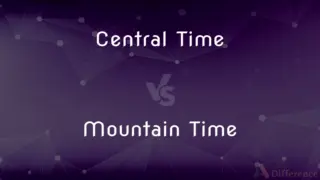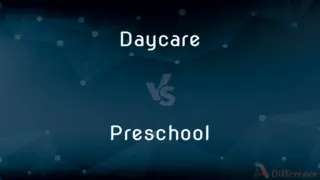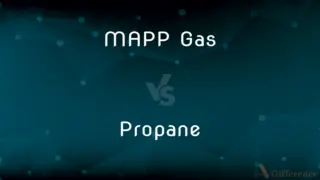Multithreading vs. Multitasking — What's the Difference?
By Tayyaba Rehman — Published on September 10, 2023
Multithreading is the concurrent execution of multiple threads within a program, while multitasking involves running multiple tasks or processes concurrently.

Difference Between Multithreading and Multitasking
Table of Contents
ADVERTISEMENT
Key Differences
Multithreading is a specialized form of multitasking where multiple threads, the smallest units of a program, run concurrently within a single process. It's akin to multiple hands working on a single task. Multitasking, conversely, allows multiple tasks or processes, often independent, to run simultaneously, like multiple individuals doing different tasks.
Multithreading leverages a single set of resources and memory, focusing on optimizing a specific application's performance. Different threads can share the same resources within a program. In multitasking, different tasks may need separate resources, as they might not be related to the same application or process.
In terms of efficiency, multithreading can be beneficial in scenarios where tasks are interdependent, as threads communicate effortlessly within the same process. On the contrary, multitasking might induce overhead due to the context-switching between different tasks or processes, especially if they're unrelated.
From a user's perspective, multithreading often remains hidden, refining the performance of a specific application. Multitasking, however, is more visible, as a user might run a browser, a word processor, and a music player all at once on their device.
In conclusion, while both multithreading and multitasking aim to optimize the use of computing resources, they differ in scope. Multithreading focuses on threads within a single process, whereas multitasking emphasizes concurrent task or process execution.
ADVERTISEMENT
Comparison Chart
Definition
Execution of multiple threads within a program
Running multiple tasks or processes concurrently
Scope
Within a single process
Across multiple processes
Resource Sharing
Shares resources within the same process
Each task might need separate resources
Efficiency Factor
Ideal for interdependent tasks
Can have overhead due to context-switching
User's Perspective
Enhances a single application's performance
Allows running multiple applications simultaneously
Compare with Definitions
Multithreading
Technique improving computational speed by parallel thread execution.
Multithreading allows a video editor to render while still accepting user inputs.
Multitasking
The ability to execute multiple tasks or processes at once.
Computers today are adept at multitasking, running numerous applications simultaneously.
Multithreading
Concurrent execution of multiple threads within a single program.
Modern CPUs utilize multithreading to optimize application performance.
Multitasking
A method allowing a CPU to manage multiple tasks concurrently.
Thanks to multitasking, she could browse the web while printing her document.
Multithreading
A means of achieving parallelism at a thread level in a process.
With multithreading, data processing can occur while waiting for user input.
Multitasking
Concurrent management and execution of more than one task.
Operating systems use multitasking to optimize system responsiveness.
Multithreading
The division of a task into smaller simultaneous running threads.
Multithreading can make game graphics smoother by distributing workload.
Multitasking
Allows users to switch between tasks with minimal lag or delay.
On her phone, multitasking lets her switch between chat and music effortlessly.
Multithreading
Facilitates multiple actions within an application without interruption.
Multithreading ensures uninterrupted playback even when adjusting volume.
Multitasking
A technique maximizing resource utilization by juggling tasks.
Multitasking ensures the CPU isn't idle while waiting for a task to complete.
Multithreading
(computing) The use of multithreaded code.
Multitasking
The concurrent operation by one central processing unit of two or more processes.
Multitasking
The engaging in more than one activity at the same time or serially, switching one's attention back and forth from one activity to another.
Multitasking
Present participle of multitask
Multitasking
(computing) The simultaneous execution of multiple tasks (programs) under the control of an interrupt-driven operating system.
Multitasking
The practice or capability of handling more than one task at the same time.
Common Curiosities
What's the primary purpose of multithreading?
Multithreading optimizes a program's performance by allowing concurrent execution of its threads.
Is multitasking only software-based?
No, multitasking can be both software-based (OS management) and hardware-based (multiple CPUs or cores).
How does multithreading enhance CPU efficiency?
Multithreading ensures better resource utilization, making sure a CPU doesn't remain idle unnecessarily.
How do threads in multithreading communicate?
Threads in multithreading share the same memory space, allowing easier communication via shared variables.
Can multithreading exist without multitasking?
Yes, a system can support multithreading within a single process without running multiple processes concurrently.
Is multitasking the same across all devices?
No, multitasking capabilities vary based on hardware and OS optimizations.
What's the potential downside of multitasking?
Multitasking can lead to overhead due to frequent context-switching and resource contention.
Are there limits to multitasking?
Yes, hardware limitations and task conflicts can put bounds on efficient multitasking.
Why is multitasking essential for modern operating systems?
It enhances system responsiveness and allows simultaneous application executions for users.
How does multitasking benefit computer users?
Multitasking allows users to run multiple applications or tasks simultaneously, enhancing productivity.
What's a real-world example of multithreading?
Web browsers use multithreading to load elements of a webpage simultaneously.
Can multitasking lead to system slowdowns?
If resource contention is high or there's excessive context-switching, multitasking might slow down the system.
Can multithreading lead to issues in a program?
Yes, without proper management, multithreading can cause race conditions or deadlocks.
How do multithreading and multiprocessing differ?
While multithreading deals with threads within a process, multiprocessing involves multiple processes running on multiple CPUs.
How do developers decide to use multithreading?
Developers consider task interdependence, data sharing needs, and potential performance benefits.
Share Your Discovery

Previous Comparison
Wealth vs. Income
Next Comparison
Remander vs. RemainderAuthor Spotlight
Written by
Tayyaba RehmanTayyaba Rehman is a distinguished writer, currently serving as a primary contributor to askdifference.com. As a researcher in semantics and etymology, Tayyaba's passion for the complexity of languages and their distinctions has found a perfect home on the platform. Tayyaba delves into the intricacies of language, distinguishing between commonly confused words and phrases, thereby providing clarity for readers worldwide.















































